Relationship of Surgical Approach With Financial Toxicity in Patients With Resected Lung Cancer
ABSTRACT
Introduction
Minimally invasive surgery (MIS) reduces lengths of stay, complications, and potentially perioperative hospital costs. However, the impact of MIS on financial toxicity (FT), defined as the costs resulting from oncologic care and their negative effects on quality of life, in patients with lung cancer is unknown. Our objective was to investigate the association between surgical approach and FT in this population.
Methods
A single-institution study was performed evaluating resected lung cancer patients (2016–2021). FT was assessed using the Comprehensive Score for Financial Toxicity (COST) questionnaire. The relationship between surgical approach (MIS vs. thoracotomy) and FT was evaluated using propensity score-matched (PSM) regression analysis. A sensitivity analysis involving the entire cohort was also performed using an inverse probability-weighted generalized linear model.
Results
As reported previously, of 1477 patients surveyed, 463 responded (31.3%) with FT reported in 196 patients (42.3%). Resection was performed by thoracotomy in 53.3% (n = 247), and by MIS in the remainder (n = 216, 46.7%; video-assisted thoracoscopic surgery [VATS] = 115; robotic-assisted = 101). There was no difference in FT in patients who underwent VATS and robotic-assisted surgery (p = 0.515). In the PSM analysis, MIS was not associated with FT (odds ratio [OR]: 0.980, 95% confidence interval [CI]: 0.628–1.533, p = 0.929). Similar results were found on sensitivity analysis (OR: 1.488, CI: 0.931–2.378, p = 0.096).
Conclusions
Compared to MIS, thoracotomy was not associated with FT in patients with resected lung cancer. Though there are several benefits from MIS, it does not appear to be a meaningful strategy to alleviate FT in this population.
Open Research
Data Availability Statement
The data that support the findings of this study are available from the corresponding author upon reasonable request.




